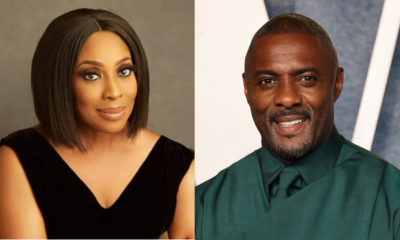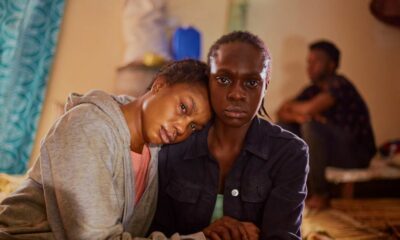News
Mo Abudu Scoops Exclusive Interview with US Secretary of State Hillary Rodham Clinton
 US Secretary of State – Hillary Rodham Clinton visited various African countries earlier this month. As part of her African tour, she visited Nigeria where in line with the Obama administration’s firm stance on the state of affairs in some African nations, her message t Nigerian political leaders was basically – clean your act up.
US Secretary of State – Hillary Rodham Clinton visited various African countries earlier this month. As part of her African tour, she visited Nigeria where in line with the Obama administration’s firm stance on the state of affairs in some African nations, her message t Nigerian political leaders was basically – clean your act up.
Moments With Mo host, Mo Abudu secured an exclusive videotaped interview with Secretary of State Clinton. Below is the transcript. The show will be aired soon during the new season of Moments With Mo.
________________________________________
MO: Madame Secretary, the challenges facing the African woman are many, from poverty to lack of education, to, you know, non-participation in governance, especially in the numbers that we require; physical abuse, sometimes mental abuse; the glass ceiling syndrome. How can we persuade our leaders that the status of women is a priority issue for them?
SECRETARY CLINTON: That is such a great question, and it’s one that I have been devoted to answering for many, many years now because the evidence is overwhelming. You can look at economic studies, World Bank studies, sociological studies that have piled up on shelves across the world, that if you do not empower women, you do not give them the tools to make good choices in their own lives, education and health care, access to credit, participation in their societies, then your country cannot develop beyond a certain point.
MO: Right.
SECRETARY CLINTON: It is just a fact; you cannot leave most of the other half of the country behind.
MO: Half of the country behind.
SECRETARY CLINTON: And in Africa, women work so hard. And here in Nigeria, 70 percent of the small farmers are women, as they are throughout Africa. Women get up in the morning, they tend to their children, they tend to their husband, they tend to their crops and their livestock, they cook, they bring firewood. It’s a never-ending work.
MO: Never-ending work.
SECRETARY CLINTON: And I remember, years and years ago being in Africa, and an economist had said, well, it’s too bad women make no economic contribution.
MO: Hello? (Laughter.)
SECRETARY CLINTON: Hello? And of course, what he was meaning, in the most narrow technical sense, is that most of what African women do all day, every day —
MO: Is not being rewarded.
SECRETARY CLINTON: — is not in the formal economy. But if African women decided to stop working tomorrow, the whole continent would shut down. People wouldn’t eat. Crops wouldn’t be planted and harvested, a lot of the informal retail market would not go on, just in every area you can imagine. So from an economic perspective, empowering women is critical. Obviously, from a human perspective, from a moral perspective, we’re in the 21st century; all human beings, no matter what religion or ideology you reference, have the right to develop to their God-given potential. And too many women in too many parts of Africa are —
MO: Are not being developed fully.
SECRETARY CLINTON: They are not being developed fully.
MO: And not being educated.
SECRETARY CLINTON: That’s right.
MO: They’re not able to play a role. They’re not able to participate in government.
SECRETARY CLINTON: That’s right.
MO: And that needs to change. That needs to happen.
SECRETARY CLINTON: And that also, unfortunately, as you know so well, perpetuates problems of the next generation. Because if you educate a man, you educate a man. If you educate a woman, you educate a family.
MO: A family.
SECRETARY CLINTON: And a community. And what we want are educated children. And Nigeria has a huge population under the age of 15. If their mothers are illiterate, if their mothers cannot advocate for them, if their mothers cannot get access to healthcare for them, we just perpetuate the cycle of dependence and impoverishment.
MO: And it goes on and on and on. Thank you, Madame Secretary.
In your trip to Kenya, you spoke about stereotypes and that they were stale and they were outdated. At Inspire Africa, when I started this journey, we coined a phrase that we called the five Ds, and that the Western media keep portraying Africa in this light. And they are disease, despair, destitution, disaster, and destruction.
Now, if the Western media keep portraying that image of Africa that is outdated and stale, as you also said, you know, this would – could this have an impact on investment into the continent? It impacts the mindsets of those that you meet, even as the African person, if this is the picture that you continually see. How do we fight against these stereotypes or these five Ds, as we have coined them?
SECRETARY CLINTON: Well, I think you have, unfortunately, accurately depicted the stereotypes that exist. Part of the reason for my trip so early in my time as Secretary of State is to talk about both the opportunities and the problems. I mean, every society has both. There is no perfect society. Some places in Africa are much further along than other places. But every society has to be constantly taking stock. In a democracy particularly, you have to hold your leaders accountable. You have to say, “You said you would do this for me – more electricity. You have to deliver.”
So there’s a constant give-and-take that has to go on. And I think it’s important that more voices like yours be speaking on behalf of Africa. Look, I’m not going to sugarcoat the issues that we all know about. I was in Goma yesterday in eastern Congo. Horrible, horrible —
MO: Stories.
SECRETARY CLINTON: — atrocities.
MO: Yes.
SECRETARY CLINTON: But at the same —
MO: They need to be spoken about, yes.
SECRETARY CLINTON: And they need to be spoken about. But at the same time, let’s look for the positive, inspiring stories —
MO: Positive things, yes.
SECRETARY CLINTON: — so that people believe there’s hope, and that if they work hard, they too can be successful. I mean, if all you hear is the negative, it’s like raising children. If you’re only negative to a child, over and over again —
MO: Exactly. “You’re stupid, you’re silly, you’re this, you’re that” – then they become that.
SECRETARY CLINTON: That’s exactly right. They have no positive self-esteem. Africa’s got so many great things happening here. And not only that, I mean, the joy of so many people in Africa is contagious. It’s –
MO: We are considered the happiest nation, apparently, Nigerians. (Laughter.)
SECRETARY CLINTON: Well, I mean, there is something about people feeling good about themselves. Now, you have to do more on behalf of your society.
MO: Yes.
SECRETARY CLINTON: But there is a story that I’d like to be more comprehensive than just the five Ds, as you say.
MO: Yes. And also for there to be balance in the reporting.
SECRETARY CLINTON: Exactly.
MO: Thank you, Madame Secretary. As an African people, we are very submissive, we are very accepting. Authority is something that we respect very much. So in this society of ours, when we see things going wrong, how can we as citizens make change happen? Because we are so accepting and we are so submissive, what do we do?
SECRETARY CLINTON: I think that’s an interesting analysis. I’ve never heard it put like that before. Every society has social and psychological characteristics. And what you say will cause me to think very hard on your description. But assuming that your description fits generally, I think there are several approaches.
One, there are huge extended families within Nigeria, as you know. And I think within families, a lot of change can start. As young people say to themselves, I want to have better opportunities, you tell your elders. I mean, for young girls, we want them to go to school; for communities, we want schools to be present; for people who are sick or for young women about to become mothers, we want health clinics. There is a lot which people can do, speaking up and advocating for themselves. And it’s not just at the national authority here in Abuja, it’s at the local authority, at the state authority. I know I learned that all of the governors in Nigeria have banded together to finally get rid of polio in Nigeria.
MO: Yes.
SECRETARY CLINTON: Well, there are lots of problems like that that can be taken to your local government to make the case.
And then on a broader basis, Nigeria has to have vigorous elections that are credible and free and produce outcomes that people accept. I know that your parliament is currently looking at an electoral reform law. People should stand up and say, we need that. In a democracy, you contest for elections – and I’m a witness and an exhibit of this –some people win and some people lose. I’ve won some elections, I’ve lost some elections. So part of what you have to understand is that you can’t always win, but a fair electoral process will give everyone the chance that they have the opportunity to win.
And I think, finally, people need to be speaking out to their elected officials on what they need to have the benefits of development. There’s corruption in every country. We know there’s corruption in this country, and we know that the benefits of the riches of oil do not get to the vast majority of people in Nigeria.
MO: That need it, yes.
SECRETARY CLINTON: And so people need to be saying, “I deserve electricity. I deserve food security. I deserve the kind of development that a country with so many riches as ours should be able to produce for people.”
MO: To give to people, definitely. And talking about democracy, what do you consider to be the essential elements that we need to establish and to build a culture of transparency and accountability in our democratic process? Because that is so key to ensuring that all of this can come to – can happen, can (inaudible).
SECRETARY CLINTON: Well, you’re right to ask about ingredients plural, because some people think you hold an election, therefore you’re a democracy. But that’s not right. First, the election has to be free, fair, credible, legitimate. And that’s very important for Nigeria. Secondly, there has to be a real opportunity to contest an election. That means that people don’t just show up and say, “I want to run for office.” You have to build grassroots political organizations. You have to build networks of support so that when you contest an election, you stand for something.
MO: Of course.
SECRETARY CLINTON: There has to be a free and independent judiciary. There has to be a free and independent press, which you are a symbol of.
MO: Yes.
SECRETARY CLINTON: There has to be an awareness that people inculcate in their hearts and their minds that everyone in the ballot box, everyone in a democracy, is equal. Someone may be a billionaire and you may be a poor villager, but your voice counts as much as anyone’s.
MO: So that’s when you become one.
SECRETARY CLINTON: Yes.
MO: That’s when everybody’s on the same playing field.
SECRETARY CLINTON: That’s right. And because –
MO: One man, one vote.
SECRETARY CLINTON: That’s right. And because Nigeria is so diverse –
MO: Yes.
SECRETARY CLINTON: — you have such pluralities of – someone said to me today that it is many nations made into one nation.
MO: Into one nation. 150 million people.
SECRETARY CLINTON: That’s right. You have to protect minority rights. Just because someone’s in the majority, that doesn’t mean you ignore the rights of the minority. So there are many aspects to getting a fully functioning democracy up and going.
MO: The issue of corruption, it is widespread in Africa. What can we learn from advanced democracies on how to fight corruption in Africa?
SECRETARY CLINTON: Well, I think it’s very important that Africa tackle corruption, because the development of Africa is being undermined by corruption. And we have offered several ideas: more transparency, more information about the revenues coming into government and the expenses going out of government. Now that we have computers, everything should be put online. Any person in Nigeria with access to a computer should be able to find information out, that – we like to say letting sunlight be the best disinfectant.
I think it’s also important to have a strong investigative arm within the government, prosecutors and law enforcement who do not favor any party or any person. There’s an Elections and Financial Corruption Commission, the EFCC, that needs to be strengthened with good leadership. And we will try to continue to support that.
I think it’s also important to have no impunity. People often know who the biggest perpetrators are. There needs to be an outcry, and not just from poor citizens who feel like they are being taken advantage of, but everybody who has risen up in this society needs to recognize that if you don’t get 150 million Nigerians to believe that the society works for them, you will begin to see splintering of that unity and that union. That would be terrible for Nigeria.
So taking on corruption is an economic issue, it’s a justice issue, but it’s also a political issue, it’s a cultural and an ethical issue. And all of that need to be kept in mind.
MO: Wonderful. Madame Secretary, I believe our time is up.
SECRETARY CLINTON: Oh, what a shame. I’ve enjoyed talking to you.
MO: I wish I could be here, but I’m trying to keep to the agreement that we had initially. But it’s been short, but it really has been an experience. It’s been an amazing opportunity for me, and I want to thank you so much.
SECRETARY CLINTON: Thank you. Well, thank you for having me.
MO: And we celebrate you, and you know, you really are someone that inspires women. So – all your achievements, it’s – we’re proud of you.
SECRETARY CLINTON: I appreciate that very much. Thank you so much, Mo.
MO: Thank you.























